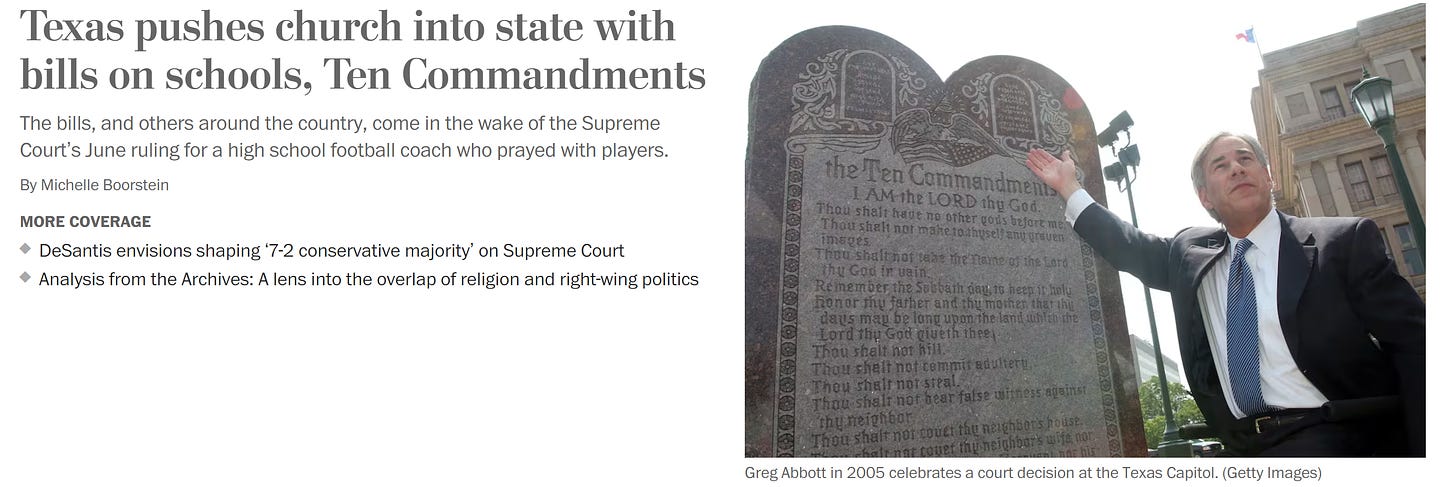A bent piece of metal caused technocratic heads to explode last week. The instigating event was an announcement from the Los Angeles Department of Transportation.
Yes, La Sombrita. It means “the shadow” in Spanish, and also means “the problem of bad municipal government has become undeniable” in any language. LADOT spent $200,000 to develop but not perfect an awning, which is technology that small Italian restaurants have had for at least a century. Each unit costs $10,000, even though sheet metal and a drill bit will run you $61 at Home Depot. Plus, you could also — whoa, brainstorm here — not drill the holes and get even more shade!!! La Sombrita features a solar-powered light, and if that makes you think “then maybe it’s not completely fucking stupid,” hold that thought until you see the light:
Many liberals (including me) have noticed that cities run by progressives are often terrible at, you know….progress. We can’t build anything. Our red tape fetish is so severe that it should probably have its own PornHub category. Every stakeholder must have a say, even — nay, especially if they’re nuts. And, as La Sombrita demonstrates, cities sometimes partner with nonprofits who add value to city government in the same way that a grisly murder adds value to real estate.
The kicker to the sick joke that is La Sombrita is that it’s part of LADOT’s “Gender Equity Action Plan”. You see, LADOT did a survey, and women said that they wanted shade and light at bus stops. I don’t know if that was their top priority; as someone who spent last summer riding LA public transit, I’d guess that “reduce the horror show of drug-induced mania and untreated psychosis that’s present on almost every bus” was probably a popular response. I also doubt that women requested barely enough shade to cover a gerbil and light that only hits you if you’re hovering eight feet off the ground. At any rate: There was a DEI element to La Sombrita, and that makes me wonder if paying lip service to diversity was the priority and actually improving public transit was an afterthought.
Another story in the La Sombrita vein caught my eye this week. This one:
Lawmakers in Texas are debating a bill that would require the Ten Commandments to be posted in every classroom in the state. It’s part of a flurry of religious-themed bills; Texas has already passed bills allowing public schools to set aside time for prayer and requiring schools to post donated “In God we trust” signs. They almost passed a bill to build a statue on the Capitol grounds of a pregnant woman with a see-through belly and fetus inside. What a lovely addition that would have been! It’s so nice to have public spaces where we can congregate, relax, and contemplate abortion in the most graphic manner possible.
These bills are spurred by a Supreme Court decision that ruled in favor of a public school football coach who led his team in prayer. That case amused me, because when I played freshman football at a public school in Virginia in the ‘90s, every single practice ended with a prayer. It was part of the serial blurring of lines between church and state at my school. For what it’s worth, the results underwhelmed: Despite praying after every practice and three times on game days, the Lord thy God deemed us worthy of only a 2-7 record and a last place finish in the Southeastern Division. Maybe if we had prayed to Buddha, he would have granted us a decent quarterback and an O line that didn’t leak like a dollar store condom.
High school is where I learned to dislike performative righteousness. My town was just so church-y. And I come from a church-going family; we practiced a prim form of Protestantism whose only real tenet was that anything fun is probably a sin. But the performative Christianity we encountered when we moved to Virginia was new to us. People crammed Jesus into every conversation — you’d buy a muffin, and the cashier would say “Jesus loves you!” You’d tell someone that your car is in the shop, and they’d say “I’ll pray on it for you” (as if God has time for that crap). In much the same way that every Kiss song is at least obliquely about sex, every interaction in my town was somehow about Jesus.
It’s pretty clear what people were doing: They lived in a place where a belief system was dominant, and they got social credit for demonstrating their adherence to that belief system. And once the performative righteousness ball starts rolling, it can snowball quickly, because the more people show off, the more it seems like anyone not showing off might be an apostate. I definitely felt that pressure; I joined the post-practice prayers just so that I didn’t stick out. They could have been praying to Jeffrey Dahmer’s ghost, and I would have gone along with it just so that people didn’t think I was weird.
In everyday life, I consider virtue signaling cringe-inducing but fine. I mean…whatever, right? That “Jesus loves you!” at the muffin shop didn’t ruin my day — it was just weird. But problems start when self-righteousness becomes a motivation for getting involved in politics. Politics is the art of the possible; it’s not the art of yelling “look at how awesome I am!” at the top of your lungs. At least, it’s not supposed to be. But some people are clearly only involved in politics as part of a broader project of cultivating a self-image.
Do Texas legislators really think that posting the Ten Commandments in schools will help kids? They say that they do; state Senator Mayes Middleton said “When prayer was taken out of schools, things went downhill — discipline, mental health.” But — feel free to think I’m an asshole — I don’t think that state Senator Mayes Middleton actually believes that. I think he’s a holy roller who wants to show the world how Jesus-y he is. I suppose there’s an infinitesimal chance that he truly does believe that reading “Thou shalt not make unto thee any graven image” will cause a teenager to ditch the Latin Kings for the Boy Scouts, but if that’s true, then I have, incredibly, underestimated the stupidity of some Texas state Senators.
The politics of performance is never the politics of progress. It can’t be, because progress isn’t the goal — the goal is to enhance one’s status. It’s a politics of ostentatious culture war nonsense that’s content to fight the same battles indefinitely because the purpose isn’t to win; the purpose is just to show which side you’re on.
There’s no denying that virtue signaling has become a big part of progressive politics. Sometimes, it feels like it’s the whole ballgame; La Sombrita was one of those times. I find virtue signaling obnoxious whether it’s left, right, or center, but it strikes me as obnoxious and antithetical when it comes from the left. I think conservatism is compatible with virtue-signaling wankery: After all, when you’re unable to stand athwart history yelling “stop!”, dragging the national dialogue into some stupid fight about woke M&Ms will work almost as well. But I think progressives should be more purposeful. We’re trying to build the future, not conserve the past, so we need to convince people that we have a clear vision and good ideas. Unfortunately, we often devolve into unhinged virtue signaling, like this truly bananas floor speech from a state Senator in Nebraska (the speech flies off the rails and crashes into an orphanage around 1:30).
This type of cultish lunacy squanders trust that’s difficult to win back. To most people, progress means things like better functioning services and a higher standard of living. When they see their public officials engaging in a pattern of activist-babble virtue signaling — while real needs go unmet — they suspect that those officials can’t deliver results. And they’re probably right, because the only “result” the official is seeking is “popularity among their peers”.
People become politically active for different reasons. Some like the grandeur, some like the combat, some have a Steve Kornacki fetish and are just hoping to get close to him. But I honestly think that most people — including people with whom I disagree — become political because they’re doing what they think is right. That sounds pretty noble, and it certainly is…sometimes. Of course, “I’m doing what’s right” can also mean “I’m doing what I think is required by an ideology that’s important to my sense of self, and my goals are to build social credit and buttress my self-perception.” I really wish that type of thinking would get the fuck out of politics. Because I find it annoying, distracting, and absolutely not progressive.






Spot on, well said! It’s got a lot worse with the advent of social media - now every nut job politician can perform to their fan base all the time. It tends to confirm my belief that politics is a personality disorder.
LA, virtue signalling, pfft. Those guys are amateurs. You want real virtue signalling head three hours north by plane where the big heads in Calgary decided that Canada Day our NATIONAL HOLIDAY similar to July 4th needs to be "DIE"ed. “For many Calgarians this is a day of mourning or reflection,” ...... , Calgary said it would “offer diverse, educational and inclusive programming for Calgarians to celebrate culture and community.” WTF, the day we celebrate our country, which by the way is generally a pretty damn good place to live, should instead be for "mourning and reflection"?
Follow on, the Calgary city council, to their credit, also said WTF and canceled the cancellation